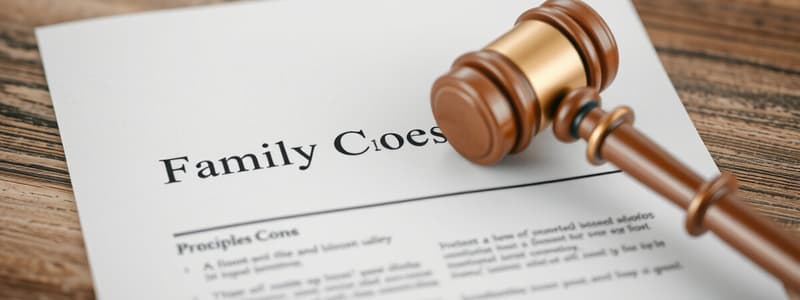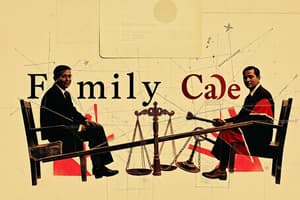Podcast
Questions and Answers
What are the three nodes of celebration of marriage according to the marriage laws?
What are the three nodes of celebration of marriage according to the marriage laws?
Religious, customary, and before the office of civil status.
What are the two main ways a marriage can be dissolved by operation of law?
What are the two main ways a marriage can be dissolved by operation of law?
By death or declaration of absence and by violation of essential conditions of marriage.
What are the two approaches to divorce adopted in Ethiopia?
What are the two approaches to divorce adopted in Ethiopia?
Consensual (fault-based) and non-fault based.
What is a major argument against the non-fault based approach to divorce?
What is a major argument against the non-fault based approach to divorce?
From a human rights perspective, why is the right to divorce important?
From a human rights perspective, why is the right to divorce important?
What is the definition of family according to the provided content?
What is the definition of family according to the provided content?
What is the implication of a couple being forced to stay married?
What is the implication of a couple being forced to stay married?
What are the two common forms of family mentioned?
What are the two common forms of family mentioned?
What is a relationship by consanguinity?
What is a relationship by consanguinity?
What does mutual consent in the context of marriage dissolution refer to?
What does mutual consent in the context of marriage dissolution refer to?
What are the two forms of consanguinity relationship?
What are the two forms of consanguinity relationship?
Which legal systems primarily adopt the non-fault based approach to divorce?
Which legal systems primarily adopt the non-fault based approach to divorce?
How is the degree of relationship determined in collateral relationships?
How is the degree of relationship determined in collateral relationships?
What is a nuclear family?
What is a nuclear family?
What characterizes an extended family?
What characterizes an extended family?
What are the foundational concepts of family law?
What are the foundational concepts of family law?
What negative impacts were identified with the fault-based approach in divorce according to the RFC?
What negative impacts were identified with the fault-based approach in divorce according to the RFC?
Why did the RFC adopt a non-fault based approach for divorce in Ethiopia?
Why did the RFC adopt a non-fault based approach for divorce in Ethiopia?
Is arbitration compulsory or optional under the RFC in Ethiopia?
Is arbitration compulsory or optional under the RFC in Ethiopia?
What are the justifications for compulsory arbitration under the civil code of Ethiopia?
What are the justifications for compulsory arbitration under the civil code of Ethiopia?
List some common features of arbitration under the Ethiopian civil code.
List some common features of arbitration under the Ethiopian civil code.
What effect does living separately for a long period without divorce have on the marriage?
What effect does living separately for a long period without divorce have on the marriage?
What is one of the major criticisms against the fault-based approach in divorce cases?
What is one of the major criticisms against the fault-based approach in divorce cases?
How does the option for divorce by mutual consent differ from divorce by petition in the RFC?
How does the option for divorce by mutual consent differ from divorce by petition in the RFC?
What does Article 8 of the UNCRC state regarding a child's right to identity and secrecy?
What does Article 8 of the UNCRC state regarding a child's right to identity and secrecy?
What are considered unlawful acts in intercountry adoption?
What are considered unlawful acts in intercountry adoption?
Is it possible to revoke an adoption, and under what conditions?
Is it possible to revoke an adoption, and under what conditions?
What does Article 806 of the civil code state about the nature of adoption?
What does Article 806 of the civil code state about the nature of adoption?
What are the primary sources of the obligation to supply maintenance?
What are the primary sources of the obligation to supply maintenance?
Who are the parties typically obliged to supply maintenance according to Article 198 of the RFC?
Who are the parties typically obliged to supply maintenance according to Article 198 of the RFC?
What are the necessary provisions a person must supply for maintenance?
What are the necessary provisions a person must supply for maintenance?
Are adoptees included in the obligation to supply maintenance?
Are adoptees included in the obligation to supply maintenance?
What are the two key aspects regarding the status of a child at birth?
What are the two key aspects regarding the status of a child at birth?
What permission must a petitioner obtain for establishing maternal affiliation?
What permission must a petitioner obtain for establishing maternal affiliation?
What are the three major modes of ascertainment of paternity?
What are the three major modes of ascertainment of paternity?
What is the first basic element of presumption of paternity?
What is the first basic element of presumption of paternity?
What must occur for a child to be considered born or conceived within a legally provided union?
What must occur for a child to be considered born or conceived within a legally provided union?
Is cohabitation necessary in an irregular union for it to be recognized legally?
Is cohabitation necessary in an irregular union for it to be recognized legally?
Is there a duty of fidelity in an irregular union similar to that in marriage?
Is there a duty of fidelity in an irregular union similar to that in marriage?
What does Article 652(1) of the criminal code of Ethiopia state regarding adultery?
What does Article 652(1) of the criminal code of Ethiopia state regarding adultery?
Study Notes
Definition and Sources of Family Law
- Family defined as a group of persons united by marriage, filiation, or adoption, characterized by common residence, economic cooperation, and reproduction.
- Common forms of family include:
- Nuclear family: a married couple and their children.
- Extended family: multiple nuclear families related through parent-child connections.
- Three primary sources establish family relationships:
- Relationship by consanguinity: based on blood relations, either direct (from parents to children) or collateral (siblings or cousins).
- To determine the degree of collateral relationships, two methods exist:
- Civil law system: count generations from a common ancestor and add degrees.
- Marriage proof: parties can prove status through valid marriage ceremonies.
Dissolution of Marriage
- Marriage dissolution may occur:
- By operation of law (e.g., death, absence).
- By petition of one spouse or by mutual consent.
- Two main approaches to divorce in Ethiopia:
- Consensual or fault-based: both parties must agree on grounds for divorce.
- Non-fault based: either partner can initiate divorce without attributing fault, reflecting a more modern approach.
- The Ethiopian Family Code (RFC) favors the non-fault approach to avoid prolonged disputes and to respect individual rights.
Arbitration in Family Law
- Under the RFC, arbitration for family disputes is optional, contrasting with the civil code, where it is compulsory.
- Justifications for compulsory arbitration in the civil code:
- Preservation of a respected tradition for resolving disputes.
- Arbitrators typically have more qualifications compared to regular judges.
- Reduces the court's burden and lowers costs for individuals involved.
Implications of Separation in Marriage
- Separate living without divorce influences financial obligations and parental rights:
- Women not confined at childbirth or cases where paternity is in question allow disputes over maternal filiation; judgments require court permission to challenge.
- Modes of ascertainment for paternity include:
- Presumption of paternity, acknowledgment, and judicial declaration.
Adoption and Maintenance Obligations
- Adoption:
- Typically irrevocable once approved by the court, with exceptions stated in the Family Code.
- Focuses on the child’s need for a family rather than economic interests.
- Maintenance obligations imposed by law include providing for necessary livelihood needs such as food, shelter, clothing, and education.
- Key obligations under the RFC:
- Maintenance obligations extend to spouses, ascendants, descendants, and also adoptees or adopters, signifying a broader familial duty.
Studying That Suits You
Use AI to generate personalized quizzes and flashcards to suit your learning preferences.
Description
This short note provides essential points and provisions from the Family Code necessary for understanding the foundational concepts of family law. It aims to streamline your review process as you prepare for the exit exam. Focus on the key aspects outlined to grasp the rationale behind the relevant provisions.




